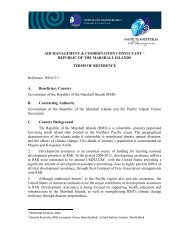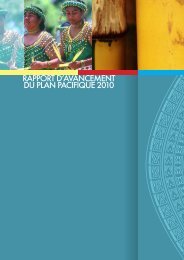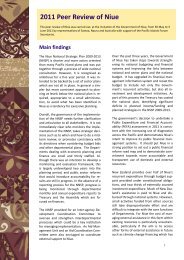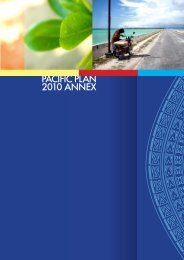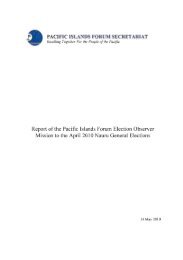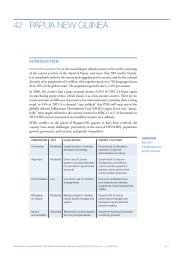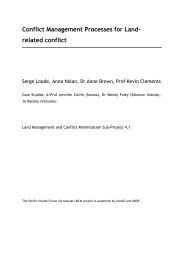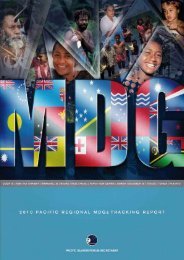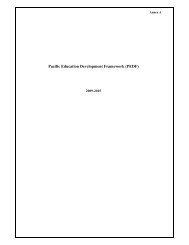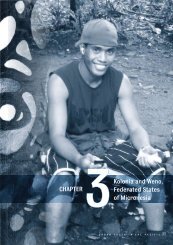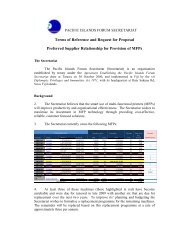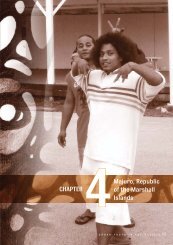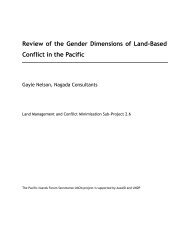Kolonia and Weno, Federated States of Micronesia CHAPTER 3 ...
Kolonia and Weno, Federated States of Micronesia CHAPTER 3 ...
Kolonia and Weno, Federated States of Micronesia CHAPTER 3 ...
Create successful ePaper yourself
Turn your PDF publications into a flip-book with our unique Google optimized e-Paper software.
40<br />
40 U R B A N N Y O U T H<br />
H I N<br />
N T H E P A C I F<br />
I C<br />
Political Institutions’ Engagement with Youth<br />
FSM has a national congress <strong>of</strong> 14 members. It also has state legislatures. Although the<br />
Convention on the Elimination <strong>of</strong> All Forms <strong>of</strong> Discrimination against Women (CEDAW)<br />
prioritizes women’s political participation, both the legislative <strong>and</strong> executive branches<br />
<strong>of</strong> government are dominated by men. Since independence there have been no female<br />
members <strong>of</strong> the national congress, 57 <strong>and</strong> currently only one out <strong>of</strong> eight department heads<br />
is a woman. 58 In 2008, only four percent <strong>of</strong> seats in state governments were held by women.<br />
Currently, there is a legislative bill pending in Congress to reserve an additional four seats<br />
for women in the National Congress. 59<br />
During consultations, young participants specifically expressed their concern that young<br />
people needed to be more actively engaged in the development <strong>of</strong> their communities<br />
<strong>and</strong> be part <strong>of</strong> decision-making processes. The need for more opportunities for dialogue<br />
between young people <strong>and</strong> decision makers was identified, so that positive contributions<br />
can be made <strong>and</strong> young people feel that they are a resource in the community rather<br />
than a burden. However, although legislatures are the foremost forums for discussing<br />
<strong>and</strong> addressing political issues, including youth issues, to date there has been limited<br />
engagement between legislators <strong>and</strong> young people. Culturally, older men <strong>and</strong> women have<br />
stronger political influence within modern <strong>and</strong> traditional leadership. In this context, it is<br />
notable that although women have long played a central role in traditional <strong>Micronesia</strong>n<br />
society, men still dominate politics <strong>and</strong> decision-making over resources in current times.<br />
For younger women, the lack <strong>of</strong> political voice <strong>of</strong> women is limited by their sex <strong>and</strong> age. Even<br />
young men have limited opportunities to engage in political life.<br />
Government Youth Policies<br />
The National Strategic Development Plan 2004-2023 is the key planning document for the<br />
nation <strong>and</strong> focuses on four key areas: (i) stability <strong>and</strong> security; (ii) improved enabling<br />
environment for economic growth; (iii) improved education <strong>and</strong> health status; <strong>and</strong>, (iv)<br />
assured self-reliance <strong>and</strong> sustainability. The Plan is aligned to the current Compact<br />
<strong>of</strong> Free Association from 2004 to 2023, during which period the US Government<br />
will provide an estimated USD 1.5 billion in funding. Although there is no specific<br />
section in the Plan which addresses youth, young people are mentioned as a<br />
group in need <strong>of</strong> support for the good <strong>of</strong> the nation throughout the document<br />
<strong>and</strong> there is a special section in the recommendations regarding youth. 60<br />
While the recommendations are useful, it is imperative that youth issues are<br />
meaningfully mainstreamed into national <strong>and</strong> state development planning, <strong>and</strong><br />
that a range <strong>of</strong> Ministries – including Health, Education, Finance, Trade <strong>and</strong> Sport<br />
– prioritize youth issues <strong>and</strong> mainstream them in their programmes. The inclusion<br />
<strong>of</strong> youth issues in the Plan is commendable, but in practice, stagnant national<br />
development has severely limited the number <strong>of</strong> new opportunities for young people<br />
once they leave school.<br />
The FSM National Youth Policy 2004-2010 is the current policy guiding youth development<br />
activities throughout the nation. The<br />
process for the Policy began in 2001<br />
at the ‘9th Annual Youth Leadership<br />
57 Human Rights Council 2010b.<br />
58 Government <strong>of</strong> FSM 2010c.<br />
59 Government <strong>of</strong> the FSM 2010b.<br />
60 Government <strong>of</strong> the FSM 2004.



